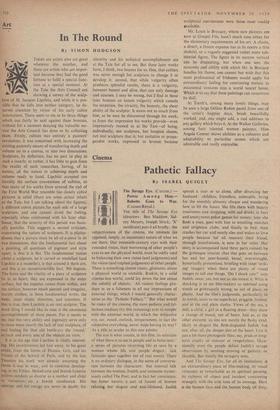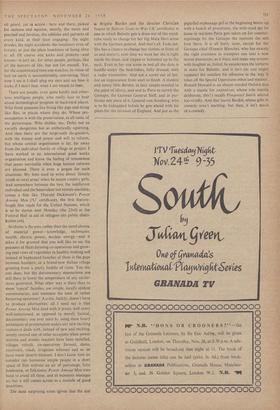Cinema
Pathetic Fallacy
By ISABEL QUIGLY The Savage Eye. (Curzon.) Power Among Men.— Babette Goes to War. (Cameo-Royal.) THE title of The Savage Eye (directors: Ben Maddow, Sid- ney Meyers, Joseph Strick; 'X' certificate) puts it all briefly : the subjectiveness of the cinema, the animate (as opposed, simply, to inanimate) nature of what we see there. Our twentieth-century eyes with their extended vision, their borrowing of other people's eyes to see the physical world, must be oddly used to balancing their own vision (and judgments) and the vision (and implied judgments) of other people. There is something almost runny, glutinous, about a physical world so unstable. Ruskin, in a solid cinema-less world, could lay down the law about the solidity of objects: 'All violent feelings pro- duce in us a falseness in all our impressions of external things, which I would generally charac- terise as the "Pathetic Fallacy." ' But what would he make of the cinema, the mostyathetic.and fal- lacious medium (by this reasoning) ever to tamper with the external world, in which the subjective eye, ear, mood, outlook, temperament, in fact the subjective everything, never stops having its way? As a title as ocular as this one admits.
The eye is what counts, in this film, its selection of what there is to see in people and in behaviour : a series of pictures recording life as seen by a woman whom life and people disgust : sick fantasies spun together out of real events. There is no ordinary dialogue, in the sense of conversa- tion between the characters: but internal talk between the woman, Judith, and someone myster- iously called The Poet, and in fact her conscience, her better nature, a sort of hound of heaven refuting her disgust and anti-lifehood. Judith spends a year or so alone, after divorcing her husband: childless, friendless, unlovable, living for the monthly alimony cheque and wondering how to fill the hours. She fills them with beauty treatments and shopping, with sad drinks in bars and anonymous poker games for money; later she finds a man, goes with him to wrestling matches and striptease clubs, and finally to bed: then crashes her car and nearly dies and wakes to love people because (of all reasons) their blood, through transfusions, is now in her veins. Her story is accompanied (and three parts ruined) by the grotesque interior chat that goes on between her and her poet-hound; banal, overwrought, hysterically pretentious, bristling with inept 'strik- ing' imagery when there are plenty of visual images to tell one things. 'Do I shock you?' says Judith, once; yes, but not as she meant it. What is shocking is to see film-makers so talented using words so grotesquely wrong, so out of place, so phony. And the film's judgments, particularly in its words, seem to me superficial, priggish, limited, and at the end plain slushy. Views of the sea, a doll, a child, a girl in a floating dress—they show a change of mood, not of heart. Just as, at the other extreme, its sins are mostly the fleshy kind, likely to disgust the flesh-disgusted Judith. but not, after all, the deeper sins of the heart. Lust is just a lot more photogenic than, say, pride or long- term cruelty or rancour or vengefulness. Occa- sionally even the people defeat Judith's savage observation by seeming moving or pathetic or likeable. But mostly the savagery wins.
And Tlw Savage Eye, for all its limitations, is an extraordinary piece of film-making, its visual virtuosity as remarkable as its spiritual poverty, its richness of object and incident contrasting strangely with the trite tone of its message. Here is the human face and the human body off duty, oil guard, yet in action : here and there, picked for sadness and squalor, mostly, the mean and pinched and loveless, the oddities and perverts of every kind, at their least engaging: the night drunks, the night accidents, the loneliness even of luxury; or just the plain loneliness of being alive at all. Of course one kicks and protests—and knows—it isn't so: for other people, perhaps, like all the horrors of life, but not for oneself. Yet, for the concentrated time one watches, its vision of hell on earth is uncomfortably convincing. Next time I see it I shall plug my ears and sec how it looks if I don't hear what I am meant to hear.
There are people, even quite kindly and other- wisz intelligent people, who really hate to hear about technological progress in backward places. Who think peasants like living like pigs and dying like flies, in places where they do. Whose pre- occupation is with the preservation, at all costs, of the picturesque. Who dislike, say, Dolci not as socially dangerous but as :esthetically upsetting. And then there are the large-scale do-gooders, with the money and power and will to reform, but whose central organisation is far, far away from the individual family or village or project. I have worked in an international good works organisation and know the feeling of remoteness that seems inevitable when huge human reforms are planned. There is even a jargon for such situations. My boss used to write about 'female youth in rural areas' when he meant country girls. And somewhere between the two, the indifferent individual and the benevolent but remote machine, comes a film like Thorold Dickinson's Power Among Men (`U' certificate), the first feature- length film made for the United Nations, which is to be shown next Monday (the 23rd) at the Festival Hall in aid of refugees (no public distri- bution yet).
Its theme is the uses. rather than the usual abuses, of material power—knowledge, techniques, wealth, electric power, nuclear energy—and it takes it for granted that you will like to see the peasants of Haiti forming co-operatives and grow- ing neat rows of vegetables in healthy-looking soil instead of haphazard bunches of them in the gaps between boulders; or a brand-new Italian village growing from a pretty huddle of ruins. You do, one does; but the documentary mannerisms are still there to lower the temperature of any excite- ment generated. What other way is there than to show 'typical' families, use simple, locally spoken commentaries, and maintain the tone of rather hectoring optimism? A critic, luckily, doesn't have to produce alternatives: all I need say is that Power Among Men (and with it pretty well every well-intentioned, as opposed to merely factual, documentary one ever sees) by using these hoary techniques of presentation makes any new exciting venture it deals with, instead of new and exciting, simply remind one of other occasions when power stations and atomic reactors have been installed, villages rebuilt, co-operatives formed, dams, reservoirs, roads, irrigation schemes and so on have made deserts blossom. I don't know how an outsider can humanise simple people in a short space of film without an air of patronage, false bonhomie, or folksiness. Power Among Men tries hard to avoid all these, and at moments manages to: but it still comes across as a muddle of good intentions.
The most surprising scene (given that the star
is Brigitte Bardot and the director Christian Jaque) in Babette Goes to War ('A' certificate) is one in which Babette gets a dress out of the ward- robe ready to change for her big Mata Hari scene with the German general. And that's all. Fade out. She has a chance to change her clothes in front of us and doesn't; next time we meet her she is right inside the dress, and zipped or buttoned up to the neck. Even in her one scene in bed all she does is huddle • under the bedclothes, fully dressed, with a radio transmitter. And not a scowl out of her, not an imprecation from start to finish. A modest and sunny little Bardot, in fact, simple-minded to the point of idiocy, and sent to Paris to outwit the Gestapo, the German General Staff, and in par- ticular one piece of it, General von Arenberg. who is to be kidnapped before he gets ahead with his plans for the invasion of England. And just as the pigtailed orphanage girl at the beginning teams up with a bunch of prostitutes, the wide-eyed spy let loose in wartime Paris gets taken on for counter- espionage by the Gestapo the moment she sets foot there. It is all fairly tame, except for the Gestapo chief (Francis Blanche), who has exactly the right craziness to transport one into a new moral dimension, as it were, and make one scream with laughter as, foiled, he enumerates the tortures in store for Babette; and it isn't (as you might suppose) the smallest bit offensive in the way it takes ofT the Special Operations ethos and manner, Ronald Howard is an absent-minded Oxford don with a mania for explosives, whose role (surely deliberate, this?) recalls Pimpernel Smith almost too vividly. And that leaves Bardot, whose gifts in comedy aren't startling; but then, it isn't much of a comedy.







































































 Previous page
Previous page